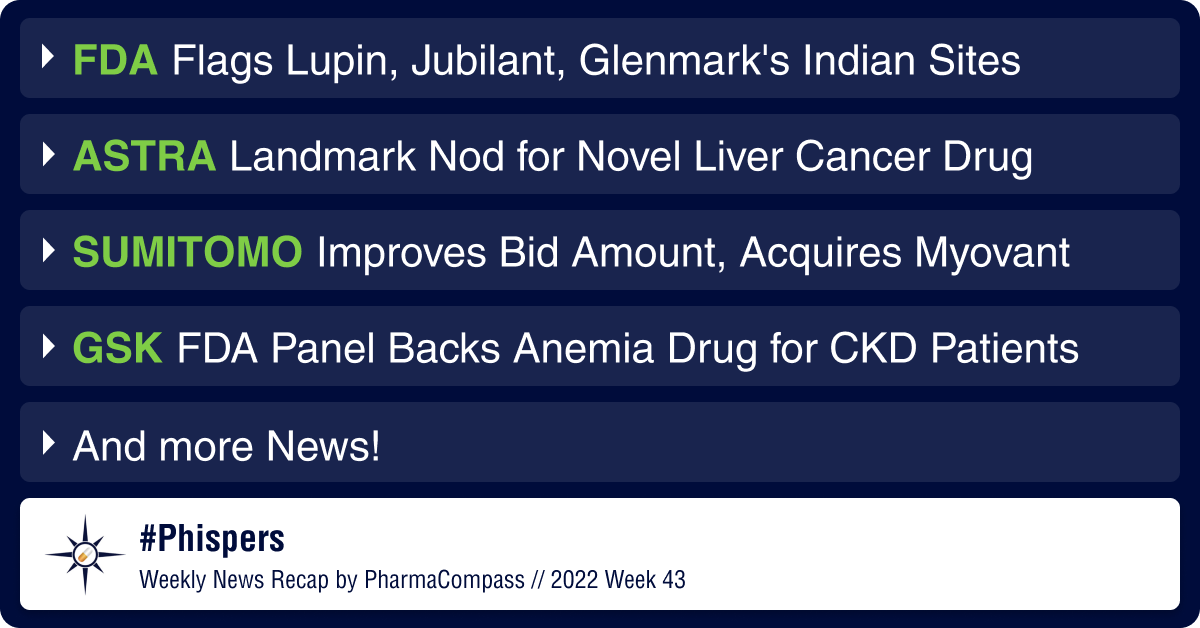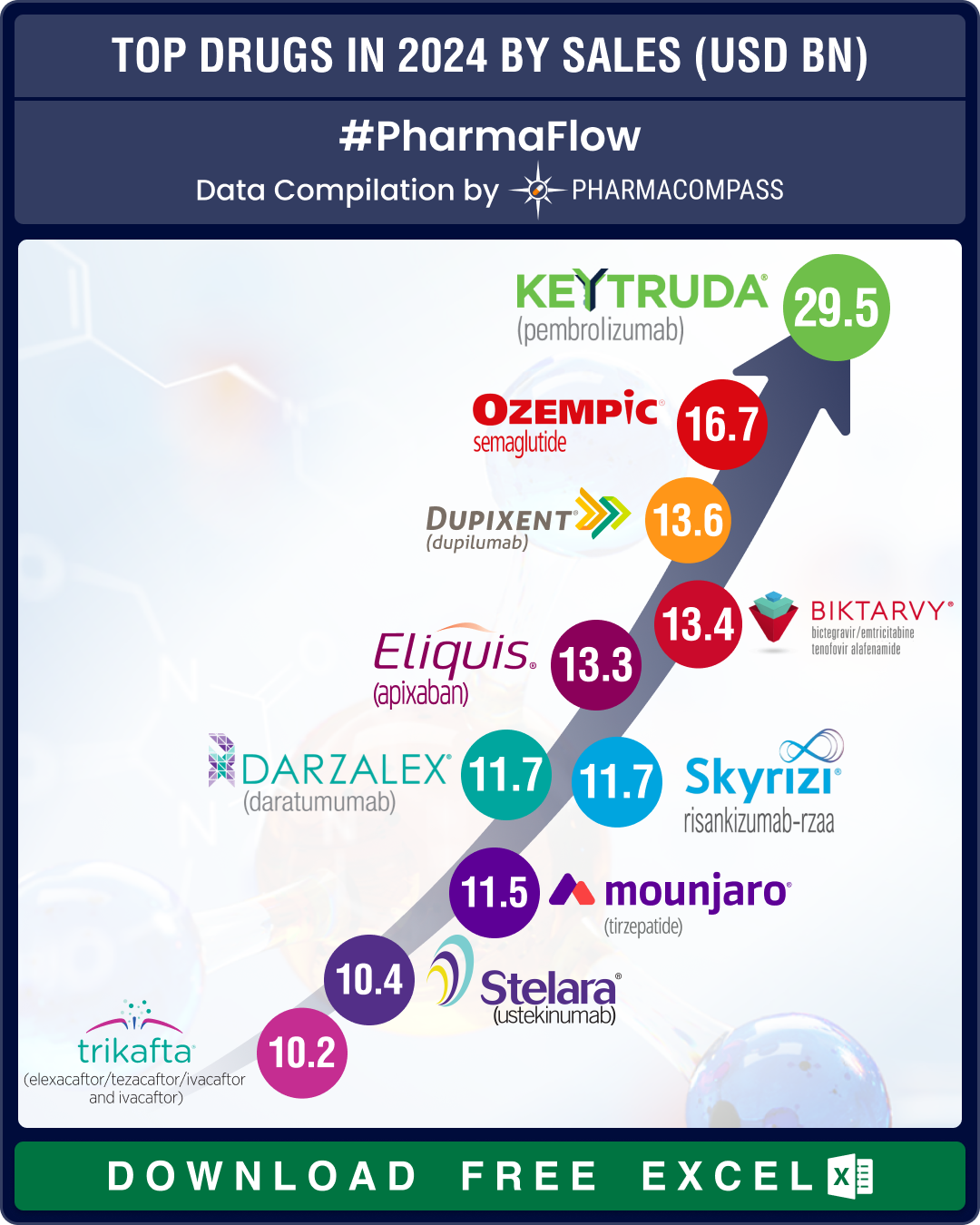
By PharmaCompass
2022-10-27
Impressions: 2,321
In recent months, the US Food and Drug Administration (FDA) has stepped up its inspections of manufacturing facilities in India. Last week, the agency issued a Form 483 with 17 observations to drugmaker Lupin’s biotech manufacturing facility in Pune, India. Jubilant’s site in north India has also received a Form 483, while the agency has placed Glenmark’s plant at Baddi under import alert.
In drug approvals, AstraZeneca’s Imjudo (tremelimumab) has bagged its first approval after a series of trial setbacks over several years. The drug, in combination with Imfinzi, has been approved by the FDA to treat adult patients with unresectable hepatocellular carcinoma (HCC), a type of liver cancer.
The FDA has granted a conditional approval to Johnson & Johnson’s therapy Tecvayli (teclistamab) for use in hard-to-treat multiple myeloma that has returned even after four or more prior lines of therapies. And AbbVie’s drug Rinvoq (upadacitinib) has bagged its sixth FDA approval as a treatment for adults with active non-radiographic axial spondyloarthritis (nr-axSpA).
Meanwhile, an expert panel to the FDA has voted in favor of GSK’s investigational oral drug, daprodustat, to treat anemia in chronic kidney disease (CKD) patients who are on dialysis. In negative news, Alpine Immune Sciences has voluntarily terminated two trials of its investigational drug — davoceticept — after the death of a second participant.
Myovant Sciences has accepted a revised buyout deal from Sumitovant Biopharma and its parent group Sumitomo Pharma after the Japanese company upped its previous offer. Roche has inked a potential US$ 955 million licensing, research and development collaboration deal with Austria-based Hookipa Pharma. And Pfizer is investing around €1 billion (US$ 987 million) to set up a new manufacturing facility at its Grange Castle site in Dublin.
FDA issues Form 483s to Lupin, Jubilant; import alert for Glenmark
The US Food & Drug Administration (FDA) has stepped up inspections of manufacturing facilities in India, which is one of the largest API suppliers to the US market. Last week, the agency issued a Form 483 with an astounding 17 observations to Lupin’s biotech manufacturing facility in Pune, India. The agency had carried out a pre-approved inspection of the manufacturing facility earlier this month. The Indian drugmaker did not specify what the observations are, but said it is committed to “expeditiously” address FDA’s concerns. Last month, Lupin had received a warning letter from the FDA for its manufacturing facility at Tarapur in Maharashtra, India.
Meanwhile, the US agency has issued a Form 483 with six observations to Jubilant Generics’ manufacturing site in Sikanderpur Bhainswal in north India. The agency issued the 14-page inspection report after an inspection in late July and early August.
Import alert for Glenmark’s Baddi plant: Glenmark Pharmaceuticals said FDA has placed its manufacturing plant at Baddi in the Indian state of Himachal Pradesh under import alert 66-40, following an inspection in June 2022. The alert implies the drugs produced at the Baddi unit can now be detained without physical examination for failing to meet drug GMPs. The FDA had placed the site under official action indicated status following the June inspection.
Issues CRL to Biocon-Viatris for insulin aspart: Drugmaker Biocon said the FDA has issued a complete response letter (CRL) regarding its biologics license application (submitted along with its partner Viatris) for insulin aspart. The CRL did not identify any outstanding scientific issues with the product, the company said. The CRL references the Form 483 observations noted during the pre-approval inspection of Biocon Biologics' integrated insulin manufacturing facility at Malaysia in August 2022, it added.
After rejection, Sumitomo improves bid amount, acquires Myovant
Earlier this month, Myovant Sciences had rejected a buyout offer from its majority shareholder Sumitovant Biopharma and its parent group Sumitomo Pharma. Back then, Sumitovant, which already owns 52 percent of Myovant, had offered to acquire the remaining 48 percent at US$ 22.75 per share in cash.
Last week, the Japanese company improved its offer to US$ 27 per share and Myovant has now accepted the deal. Sumitovant bought the remaining shares for US$ 1.7 billion in a deal that values Myovant at US$ 2.9 billion. Sumitovant’s US$ 27 per share offer is a 50 percent premium on the closing price before the company’s first buyout offer.
The deal provides Sumitovant access to Myovant’s two approved products, Orgovyx and Myfembree. While Orgovyx is approved to treat advanced prostate cancer, Myfembree has a nod to treat heavy menstrual bleeding associated with uterine fibroids and endometriosis. The deal is expected to close in the first quarter of 2023.
Roche inks potential US$ 955 million deal with Hookipa: Roche has inked a potential US$ 955 million licensing, research and development collaboration deal with Austria-based Hookipa Pharma. As part of the deal, Roche will pay US$ 25 million upfront with a potential US$ 930 million as payment for the rights to Hookipa’s investigational arenaviral immunotherapy program – HB-700 – for the treatment of KRAS-mutated cancers. HB-700 is designed to treat KRAS-mutated tumors, including cancers of the lungs, pancreas and colorectal malignancies. The Swiss pharma will also have the option to opt for another arenaviral immunotherapy.
Pfizer to build US$ 987 million site in Dublin: Pfizer plans to invest around €1 billion (US$ 987 million) to set up a new manufacturing facility at its Grange Castle site in Dublin, according to a report by Business Post, an Irish news site. The report said construction will begin in the second quarter of 2023 and is expected to be completed by 2026. Pfizer’s Grange Castle facility, built on 90 acres, has multiple manufacturing capabilities, including mammalian cell culture, protein purification and syringe filling. It employs around 1,700 people.
After multiple trial flops, Astra’s Imjudo bags first FDA nod in liver cancer
After a series of trial setbacks over several years, AstraZeneca’s Imjudo (tremelimumab) has bagged its first approval. The drug, in combination with another Astra drug Imfinzi, has been approved by the FDA to treat adult patients with unresectable hepatocellular carcinoma (HCC), the most common type of liver cancer.
Imjudo, which blocks a tumor-protecting protein called CTLA-4, is the second such approved medicine after Bristol Myers Squibb’s Yervoy. It is administered as a single dose with Imfinzi, followed by Imfinzi infusions every four weeks. It has also become the first FDA-approved dual immunotherapy treatment regimen in liver cancer.
The approval is based on the Himalaya trial in which the Imfinzi-Imjudo combo cut the risk of death by 22 percent against Bayer’s Nexavar. At three years, around 31 percent of the patients on the treatment were still alive. AstraZeneca had licensed the antibody from Pfizer in 2011. Over the years, the drug failed several trials in lung, urothelial and head and neck cancers. The pharma is currently reviewing the drug combo in first-line metastatic non-small cell lung cancer (NSCLC), and is testing it in other kinds of liver cancers, along with lung and bladder cancers.
Breast cancer drug shows benefit: In a late-stage trial, Astra’s experimental drug capivasertib was able to help patients with an advanced form of breast cancer live longer, when combined with its older cancer treatment — Faslodex — regardless of biomarker status. The combo met the study’s main goals of improving progression-free survival in an overall patient group with advanced HR-positive breast cancer and in a subgroup whose tumors had alterations in some genes.
Asthma drug fails in late-stage eosinophilic esophagitis trial: AstraZeneca’s asthma drug — Fasenra — has failed to meet one of two primary goals of a phase 3 study evaluating the drug’s benefits in eosinophilic esophagitis (EoE), an inflammatory disease that damages the esophagus and makes it hard for patients to swallow food or sip water. Earlier this year, Sanofi and Regeneron’s blockbuster drug Dupixent (dupilumab) had become the first medicine to treat EoE.
Ultomiris loses to Novartis’ oral drug in phase 3 trial: Novartis said its oral drug iptacopan bested AstraZeneca subsidiary Alexion’s rare disease drugs Soliris (eculizumab) and Ultomiris (ravulizumab) in a phase 3 trial for paroxysmal nocturnal hemoglobinuria (a rare blood disorder in which the body destroys red blood cells, leading to anemia and blood clots). The drug also hit the second primary endpoint when Novartis showed more patients on iptacopan had a 12g/dL or greater increase in hemoglobin.
J&J’s blood cancer therapy gets FDA’s conditional approval for multiple myeloma
The FDA has granted a conditional approval to Johnson & Johnson’s therapy Tecvayli (teclistamab) in hard-to-treat multiple myeloma that has returned even after four or more prior lines of therapies in adults. The four prior lines of therapy should include a proteasome inhibitor, an immunomodulatory agent and a CD38 antibody. Another line of therapy can include various combinations of drugs.
Tecvayli, a BCMA-directed bispecific antibody, is the first drug of its class to be approved for multiple myeloma. The approval comes with a boxed warning for cytokine release syndrome (a condition where the immune system reacts more aggressively than it should) and neurologic toxicity. The therapy will be available early next month, and will cost US$ 39,500 per month.
BMS’ Opdivo reduces risk of recurrence or death by 58% in melanoma patients: In September, Bristol Myers Squibb had said its blockbuster drug Opdivo (nivolumab) had clinched a win in a late-stage trial testing the drug in an adjuvant setting for patients with completely resected stage IIB/C melanoma. Last week, the pharma presented the data from the trial. BMS said the PD-1 drug reduced the risk of recurrence or death by 58 percent – translating to a hazard ratio of 0.42 of recurrence-free survival (RFS). The 12-month RFS rate for Opdivo was 89 percent versus 79 percent for placebo. However, around 10 percent of patients on Opdivo experienced grade 3/4 treatment-related adverse events versus 2 percent in the placebo arm. And among those taking Opdivo, 15 percent dropped out of the trial due to adverse events, compared to 3 percent on placebo.
Meanwhile, the FDA has accepted BMS’ application for an additional indication for Camzyos (mavacamten) in patients with obstructive hypertrophic cardiomyopathy who have severe symptoms and are referred to septal reduction therapy.
Alpine halts trials of cancer drug following patient death: In March, the FDA had placed a partial clinical hold on Alpine Immune Sciences’ phase 1 trial of davoceticept in combination with Merck’s Keytruda following the death of a patient. Now the Seattle-based pharma has revealed the death of a second trial participant, reportedly from the same cardiovascular complication as the first patient. Alpine said it has voluntarily terminated enrollment in two clinical trials of the drug following the death. While the first trial was evaluating Davoceticept as a monotherapy, the second was evaluating the drug in combination with Keytruda.
FDA delays meet on Perrigo’s OTC pill; issues Form 483 to Catalent’s Brussels site
The FDA has delayed a meeting of its advisory panel, scheduled for November 18, to discuss Perrigo’s over-the-counter (OTC) contraceptive — Opill. No new date has yet been set. This was expected to be the first approved daily OTC birth control pill in the United States.
Meanwhile, Catalent’s manufacturing site in Brussels, Belgium, was hit by a Form 483 with nine observations following an inspection by the FDA in August. The agency cited problems with air filters in aseptic areas, deficient changes to the HVAC system inside the clean rooms used for filling along with equipment issues.
AbbVie’s Rinvoq gets sixth FDA nod in chronic rheumatic disease
AbbVie’s blockbuster drug Rinvoq (upadacitinib) has bagged its sixth FDA approval as a treatment for adults with active non-radiographic axial spondyloarthritis (nr-axSpA). Patients with objective signs of inflammation who have either failed on or are not suitable for tumor necrosis factor (TNF) blockers (such as Humira) will be eligible for this treatment.
FDA’s approval is supported by data from a phase 3 trial, which assessed the efficacy, safety and tolerability of Rinvoq in adults with active nr-axSpA, a chronic inflammatory rheumatic disease that causes joint inflammation, leading to back pain and stiffness.
Acquires British biotech DJS Antibodies for US$ 255 million: AbbVie has acquired British biotech DJS Antibodies for US$ 255 million in cash. The deal will give AbbVie DJS’ platform for targeting transmembrane proteins along with an experimental drug for an aggressive form of lung disease.
FDA panel backs GSK’s daprodustat to treat anemia in CKD patients
An FDA expert panel has backed the approval of GSK’s investigational drug — daprodustat — to treat anemia in some patients with chronic kidney disease (CKD). Once approved, this will be GSK’s first drug approval since the spin-off of its consumer health division. The panel voted 13-3 in favor of the oral drug for patients on dialysis, although GSK was expecting approval for a broader CKD population.
GSK’s application for daprodustat is based on positive results from a phase 3 trial where the drug met all its primary efficacy and safety endpoints in non-dialysis and dialysis patients. The FDA is slated to decide on GSK’s drug by February 1, 2023. If approved, daprodustat will not only become the first oral treatment for anemia from CKD in the US, but also the first HIF prolyl hydroxylase inhibitor in the market.
Ends pact with Lyell: GSK has terminated its potential US$ 1 billion plus cell therapy license and collaboration pact with Lyell Immunopharma. The companies had entered into a five-year collaboration in October 2019 to research and develop potential T-cell therapies by applying Lyell’s technologies and cell therapy innovations to CAR or TCR targets.
Merck’s CEO Rob Davis to succeed Ken Frazier as chairman
Robert M. Davis, Merck’s chief executive officer, will take on the additional role of chairman of the board from December 1. He will succeed Kenneth C. Frazier, who plans to retire on November 30, 2022, after a long-tenured career at Merck that began in 1992. Frazier led the company for 10 years as president and chief executive officer, from 2011 through 2021. He has served as a Merck director since January 2011 and chairman of its board of directors since December 2011.
The PharmaCompass Newsletter – Sign Up, Stay Ahead
Feedback, help us to improve. Click here
Image Credit : Phisper Infographic by SCORR MARKETING & PharmaCompass license under CC BY 2.0
“ The article is based on the information available in public and which the author believes to be true. The author is not disseminating any information, which the author believes or knows, is confidential or in conflict with the privacy of any person. The views expressed or information supplied through this article is mere opinion and observation of the author. The author does not intend to defame, insult or, cause loss or damage to anyone, in any manner, through this article.”








